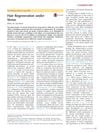 3 citations,
June 2021 in “Journal of affective disorders”
3 citations,
June 2021 in “Journal of affective disorders” Hair cortisol and cortisone levels may affect how work stress influences depression in Chinese fishermen.
3 citations,
April 2009 in “PubMed” Melatonin may protect rat hair follicles from damage caused by oxidative stress after a burn.
 2 citations,
August 2023 in “Marine drugs”
2 citations,
August 2023 in “Marine drugs” Collagen from tilapia scales may improve hair and skin health by reducing stress and inflammation and encouraging hair growth.
 1 citations,
January 2023 in “Life sciences”
1 citations,
January 2023 in “Life sciences” GABA contributes to stress-related hair loss, and ginkgolide A may help treat it.
Hair can naturally regain color after greying, and this change may be linked to stress levels.
 March 2025 in “The FASEB Journal”
March 2025 in “The FASEB Journal” Intense stress stops hair growth by halting hair follicle stem cell activity.
 August 2024 in “Biomolecules & Therapeutics”
August 2024 in “Biomolecules & Therapeutics” A new compound, HTPI, promotes hair growth by protecting cells from damage and regulating energy use.
 July 2024 in “Nursing Research”
July 2024 in “Nursing Research” Hair and nail cortisol levels can show long-term stress in young males.
 January 2024 in “GeroScience”
January 2024 in “GeroScience” Using radiation to make mice's hair turn gray helps study and find ways to prevent or reverse hair graying.
Hair can naturally regain color, and stress might influence greying and its reversal.
 194 citations,
March 2003 in “American Journal of Pathology”
194 citations,
March 2003 in “American Journal of Pathology” Stress stops hair growth in mice by causing early hair growth phase end and harmful inflammation through a specific nerve-related pathway.
 125 citations,
September 2001 in “The FASEB Journal”
125 citations,
September 2001 in “The FASEB Journal” Stress can cause hair loss by negatively affecting hair follicles and this effect might be reversed with specific treatments.
61 citations,
September 2010 in “Journal of Dermatological Science” Stress hormones and autoimmune reactions can cause hair loss.
27 citations,
August 2021 in “Journal of Autoimmunity” Human dermal γδT-cells respond to stress in hair follicles, contributing to hair loss.
11 citations,
April 2020 in “Animals” Moving horses to new places can increase their stress levels, as shown by higher stress hormone in their hair.
 7 citations,
January 2020 in “Nature”
7 citations,
January 2020 in “Nature” Stress turns hair white by depleting color-giving cells in hair follicles through a specific neurotransmitter related to the body's stress response.
2 citations,
January 2023 in “Frontiers in Oncology” Mild oxidative stress can prevent hair loss from chemotherapy.

Scalp tonics are popular for stress-related hair loss, but minoxidil is used less due to side effects and inconvenience.
 March 2023 in “Journal of clinical pharmacy and therapeutics”
March 2023 in “Journal of clinical pharmacy and therapeutics” Isoliensinine, a natural compound, prevents stress-related hair greying by blocking a specific receptor on hair cells.
August 2022 in “Ad-Dawaa' Journal of Pharmaceutical Sciences” Hibiscus rosa-sinensis L. and Baccaurea racemosa extracts help hair growth.
 August 2021 in “Journal of Investigative Dermatology”
August 2021 in “Journal of Investigative Dermatology” Stress causes hair loss by making the body produce cortisol, which stops hair cells from growing.
September 2016 in “Springer eBooks” Gray hair is caused by oxidative stress damaging hair cells.
April 2014 in “The FASEB journal” The extract helps prevent hair loss and promotes hair growth in stressed mice.
January 2006 in “International Journal of Dermatology and Venereology” Stress can cause and worsen hair loss, so managing stress is important for better hair health.
March 2022 in “Hair transplant forum international” Nutritional correction can restore hair loss caused by stress.
 59 citations,
November 2015 in “International Journal of Cosmetic Science”
59 citations,
November 2015 in “International Journal of Cosmetic Science” Oxidative stress damages hair and contributes to aging, and managing it can help maintain hair health.
 2 citations,
May 2018 in “Journal of Investigative Dermatology”
2 citations,
May 2018 in “Journal of Investigative Dermatology” Mice can regrow hair on wounds due to specific cell interactions and mechanical forces not seen in rats.

Blocking the Mitochondrial Pyruvate Carrier causes stress in hair follicles, which can be reduced by an ISR inhibitor.
 108 citations,
July 2004 in “American Journal of Pathology”
108 citations,
July 2004 in “American Journal of Pathology” Stress increases a factor in mice that leads to hair loss, and blocking this factor may prevent it.
5 citations,
January 2021 in “PeerJ” Elephant tail-hair can show past stress levels, matching times when stressful events happened.
















